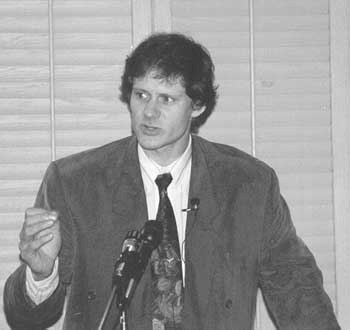Germar Rudolf Joins Journal Advisory Committee
We are pleased to welcome Germar Rudolf, a leading revisionist writer and activist, as a member of this Journal’s Editorial Advisory Committee. He is perhaps best known as the author of The Rudolf Report, a detailed 1993 forensic study based on an on-site investigation, chemical analysis of samples and meticulous research, which concludes that the “gas chambers” at Auschwitz, including Birkenau, were never used to kill prisoners as alleged. (An English-language summary edition is available through the IHR for $5.99, plus shipping.) For the past four years, the 36-year-old German-born chemist has been forced to live in exile after a German court sentenced him to a prison term for expressing dissident views on history.
Rudolf was born on October 29, 1964, in Limburg/Lahm, Germany. After completing studies – summa cum laude – in chemistry at the University of Bonn, 1983-1989, he received certification as a chemist (Dipl.-Chem.). He then served with the German air force, 1989-1990.
In the Winter of 1990-91, while working toward a doctorate in chemistry at the renowned Max Planck Institute for Solid State Physics in Stuttgart (Oct. 1990-June 1993), he began a scientific investigation of the credibility of the Leuchter Report, a 1988 forensic examination by American gas chamber expert Fred Leuchter of the alleged mass execution gas chambers of Auschwitz, Birkenau and Majdanek (Lublin). Rudolf’s “Technical Report on the Formation and Detectability of Cyanide Compounds in the ‘Gas Chamber’ of Auschwitz,” first published in January 1992, corroborates and strengthens the findings of earlier forensic investigations of purported Auschwitz “gas chambers.” (For more on The Rudolf Report, see the Nov.-Dec. 1993 Journal, pp. 25-26, and the Nov.-Dec. 1994 Journal, pp. 14-15.)
Following predictable protests from Jewish community leaders, he was fired from his position with the Max Planck Institute. Similarly, the University of Stuttgart rejected, on political grounds, his doctoral dissertation, in spite of laudatory recommendations.
A Stuttgart court declared that the Rudolf Report constitutes “denial of the systematic mass murder of the Jewish population in gas chambers,” and therefore violates German laws against “popular incitement,” “incitement to racial hatred,” and “defamation.” The judge in the case called Rudolf an anti-Semite who is “fanatically committed” to “denying the Holocaust.” The court rejected Rudolf’s request for evidence and expert testimony on the gas chamber issue because, it declared, “the mass murder of the Jews” is “obvious” (offenkundig).
German authorities also went after Rudolf for his role in writing and editing Grundlagen zur Zeitgeschichte, a revisionist anthology. (For more on this, see the May-June 1995 Journal, p. 43.) In 1996 a court fined the publisher 30,000 marks (about $18,000), and ordered all remaining Grundlagen copies to be seized and burned.
While he was still living in Germany, police carried out raids on his residence in 1993, 1994 and 1995, and on two occasions he and his family were evicted from their apartment, in each case when his wife was pregnant. After a German court sentenced him to 14 months imprisonment, Rudolf fled the country in 1996 to avoid serving the politically motivated sentence.
Since 1997 he has been director of Castle Hill Publishers in Britain (P.O. Box 118, Hastings, England TN34 3ZQ, UK), which has issued several important revisionist works, as well as editor-publisher of the scholarly revisionist journal Vierteljahreshefte für freie Geschichtsforschung. (See “Important New German-Language Revisionist Quarterly,” May-June 1998 Journal, pp. 26 ff.)
Since October 1999, a sensational British media campaign has targeted Rudolf as a “neo-Nazi fugitive,” with British authorities reportedly seeking to extradite him to Germany. (He is emphatically not a “neo-Nazi.”) The campaign also prompted new calls, above all by Jewish groups, for a British law to criminalize “Holocaust denial” similar to those in Germany, France, Switzerland and other European countries. Rudolf’s legal status in Britain is unclear because he has done nothing illegal under British law.
Rudolf has worked together with the Foundation for Free Historical Research, or Vrij Historish Onderzoek (VHO), based in Flanders, Belgium. (See the VHO web site http://www.vho.org, and “A Belgian Foundation Battles for Free Speech,” Jan.-Feb. 1996 Journal, p. 46.)
Rudolf is the editor of or contributor to several important revisionist anthologies, including Vorlesungen über Zeitgeschichte (1993) and Grundlagen zur Zeitgeschichte (1994), both published by Grabert in Tübingen under the pen name of Ernst Gauss, as well as Auschwitz: Nackte Fakten (1995), and Kardinalfragen zur Zeitgeschichte (1996), each nominally edited by H. Verbeke, and published in Belgium by VHO. Rudolf’s most recent publication is an impressive 603-page English-language anthology, Dissecting the Holocaust (available from the IHR for $50).
He was married in 1994, and has two young children, but amid the turmoil and difficulties of living in exile, his marriage has fallen apart. He addressed the 13th IHR Conference, May 27-29, 2000. Speaking with authority based on bitter personal experience, he dealt with the legal repression of dissidents in Germany.
For more about Rudolf, see the detailed article by Dr. Costas Zaverdinos in this Journal issue, as well as the information posted on the VHO web site: http://www.vho.org/Authors/Germar_RudolfE.html E-mail reaches Rudolf at: chp @ vho.org [see now at www.GermarRudolf.com; ed.]
– M. W.
Bibliographic information about this document: The Journal of Historical Review, vol. 19, no. 5 (September/October 2000), pp. 23f.
Other contributors to this document: n/a
Editor’s comments: n/a

